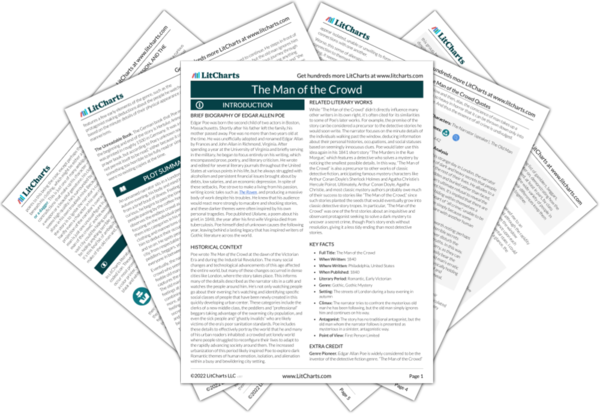The narrator spends hours people-watching from the window of a London coffee-house, entertaining himself by categorizing passersby according to their class, occupation, and other readily observable traits. But the story takes a darker turn when the narrator begins to follow a strange old man through the streets, imagining that the inscrutable man must have a remarkable history and maybe even a sinister goal in mind. With his bizarre facial expressions and unusual behavior in the crowds, the old man becomes a darkly fascinating figure in the narrator’s imagination, all because of the secrets that the old man is assumed to be keeping. Just like the reader, the narrator believes that he’s getting closer to revealing a dark truth as he follows the old man, but despite the exhausting chase, neither character is really pursuing a destination, but rather fleeing something. This is why the old man “refuses to be alone” though he ignores the people around him; he’s harboring a burden that he can’t bear to acknowledge. Indeed, as he abandons his pursuit, the narrator can only conclude that the old man is “the type and the genius of deep crime”—somehow a personification of humanity’s “worst heart.” Thus, instead of describing the dark side of human nature directly, Poe uses the unresolved pursuit to suggest that people—not just the old man, but perhaps the narrator and even the reader—keep their darkest secrets locked deep within themselves, going to great lengths to avoid them.
Dark Secrets ThemeTracker

Dark Secrets Quotes in The Man of the Crowd
Now and then, alas, the conscience of man takes up a burden so heavy in horror that it can be thrown down only into the grave. And thus the essence of all crime is undivulged.

Unlock explanations and citation info for this and every other The Man of the Crowd quote.
Plus so much more...
Get LitCharts A+Any thing even remotely resembling that expression I had never seen before. I well remember that my first thought, upon beholding it, was that Retzch, had he viewed it, would have greatly preferred it to his own pictural incarnations of the fiend.
His clothes, generally, were filthy and ragged; but as he came, now and then, within the strong glare of a lamp, I perceived that his linen, although dirty, was of beautiful texture; and my vision deceived me, or, through a rent in a closely-buttoned and evidently second-handed roquelaire which enveloped him, I caught a glimpse of both a diamond and of a dagger.
By and by he passed into a cross street, which, although densely filled with people, was not quite so much thronged as the main one he had quitted. Here a change in his demeanor became evident. He walked more slowly and with less object than before —more hesitatingly.
“This old man,” I said at length, “is the type and the genius of deep crime. He refuses to be alone. He is the man of the crowd. It will be in vain to follow, for I shall learn no more of him, nor his deeds.”











